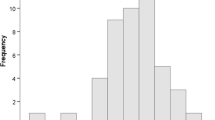Abstract
The relationship between interest and knowledge was investigated in a representative sample of 11th grade students from cultures that differ in the strength of their gender-role stereotypes and their endorsement of effort-based versus interest-based learning. Among 11th graders from the United States (N = 1052), Taiwan (N = 1475), and Japan (N = 1119), boys preferred science, math, and sports, whereas girls preferred language arts, music, and art. General information scores were comparable across the three locations; however, boys consistently outscored girls. Gender and interest in science independently predicted general information scores, whereas gender and interest in math independently predicted mathematics scores. Cultural variations in the strength of the relationship between gender, interest, and scores indicate that specific socialization practices can minimize or exaggerate these gender differences.
Similar content being viewed by others
REFERENCES
Beller, M., & Gafni, N. (1996). The 1991 International Assessment of Educational Progress in Mathematics and Sciences: The gender differences perspective. Journal of Educational Psychology, 88, 365-377.
Beller, M., & Gafni, N. (2000). Can item format (multiple choice vs. open-ended) account for gender differences in mathematics achievement? Sex Roles, 42, 1-21.
Chen, C., & Stevenson, H. W. (1995). Motivation and mathematics achievement: A comparative study of Asian-American, Caucasian-American, and East Asian high school students. Child Development, 66, 1215-1234.
Eagly, A. H. (1999). The origins of sex differences in human behavior: Evolved dispositions versus social roles. American Psychologist, 54, 408-421.
Eccles, J. S. (1994). Understanding women's educational and occupational choices. Psychology of Women Quarterly, 18, 585-609.
Feingold, A. (1993). Cognitive gender differences: A developmental perspective. Sex Roles, 29, 91-124.
Geary, D. (1996). Sexual selection and sex differences in mathematical abilities. Behavioral and Brain Sciences, 19, 229-284.
Hall, G. S. (1921). Aspects of child life and education. New York: Appleton.
Halpern, D. F. (1997). Sex differences in intelligence: Implications for education. American Psychologist, 52, 1091-1102.
Hess, R. D., & Azuma, H. (1991). Cultural support for schooling: Contrasts between Japan and the United States. Educational Researcher, 20(9), 2-8.
Hirsch, E. D. (1988). Cultural literacy: What every American needs to know. New York: Random House.
Hofstede, G. (1996). Gender stereotypes and partner preference of Asian women in masculine and feminine cultures. Journal of Cross-Cultural Psychology, 27, 533-5446.
Linn, M. C., & Hyde, J. S. (1989). Gender, mathematics, and science. Educational Researcher, 18, 17-19.
Lubinski, D., & Benbow, C. P. (1992). Gender differences in abilities and preferences among the gifted: Implications for the mathscience pipeline. Current Directions in Psychological Science, 1, 61-65.
Lubinski, D., & Humphreys, L. G. (1990). Abroadly based analysis of mathematical giftedness. Intelligence, 14, 327-355.
Mullis, V. S., Martin, M. O., Beaton, A. E., Gonzalez, E. J., Kelly, D. L., et al. (1998). Mathematics and science achievement in the final year of secondary school: IEA's Third International Mathematics and Science Study (TIMSS). Boston, MA: Boston College.
Nagpaul, P. S. (2001). Guide to advanced data analysis using IDAMS software [on-line]. Retrieved from www. un-esco. org/webworld/idams/advguide/TOC.htm.
Pintrich, P. (1989). The dynamic interplay of student motivation and cognition in the college classroom. In C. Ames & M. L. Maehr (Eds.), Advances in motivation and achievement: Motivation enhancing environments (Vol. 6, pp. 117-160). Greenwich, CT: JAI Press.
Ravitch, D., & Finn, C. E. (1988). What do our 17-year-olds know? New York: Harper and Row.
Rosenthal, R., & Rosnow, R. L. (1991). Essentials of behavioral research: Methods and data analysis (2nd ed.). New York: McGraw-Hill.
Schiefele, U. (1991). Interest, learning, and motivation. Educational Psychologist, 26, 299-323.
Schiefele, U., Krapp, A., & Winteler, A. (1992). Interest as a predictor of academic achievement: A meta-analysis of research. In K. A. Renninger, S. Hidi, & A. Krapp (Eds.), The role of interest in learning and development (pp. 183-212). Hillsdale, NJ: Erlbaum.
Stanley, J. C. (1993). Males and females who reason well mathematically. In G. R. Bock & K. Ackrill (Eds.), The origins and development of high ability (pp. 119-134). New York: Wiley.
Stanovich, K. E., & Cunningham, A. E. (1993). Where does knowledge come from? Specific associations between print exposure and information acquisition. Journal of Educational Psychology, 85, 211-229.
Stedman, L. C. (1997). International achievement differences: An assessment of a new perspective. Educational Researcher, 26, 4-15.
Stevenson, H. W., Chen, C., & Lee, S.-Y. (1993). Mathematics achievement of Chinese, Japanese, and American children: Ten years later. Science, 259, 53-58.
Stevenson, H. W., & Lee, S.-Y. (1997). Anexamination of American student achievement from an international perspective. In D. Ravitch (Eds.), The state of student scores in American schools (pp. 7-52). Washington, DC: Brookings Institute.
Stevenson, H. W., & Stigler, J. W. (1992). The learning gap: Why our schools are failing and what we can learn from Japanese and Chinese education. New York: Summit Books.
Stumpf, H., & Stanley, J. C. (1999). Stability and change in gender-related differences on the College Board Advanced Placement and achievement tests. Current Directions in Psychological Science, 7, 192-197.
Wechsler, D. (1981). Manual for the Wechsler Adult Intelligence Scale-Revised. New York: Psychological Corporation.
Williams, J. E., Satterwhite, R. C., & Best, D. L. (1999). Pancultural gender stereotypes revisited: The five factor model. Sex Roles, 40, 513-525.
Willingham, W. W., & Cole, N. S. (1997). Gender and fair assessment. Mahwah, NJ: Erlbaum.
Author information
Authors and Affiliations
Rights and permissions
About this article
Cite this article
Evans, E.M., Schweingruber, H. & Stevenson, H.W. Gender Differences in Interest and Knowledge Acquisition: The United States, Taiwan, and Japan. Sex Roles 47, 153–167 (2002). https://doi.org/10.1023/A:1021047122532
Issue Date:
DOI: https://doi.org/10.1023/A:1021047122532




